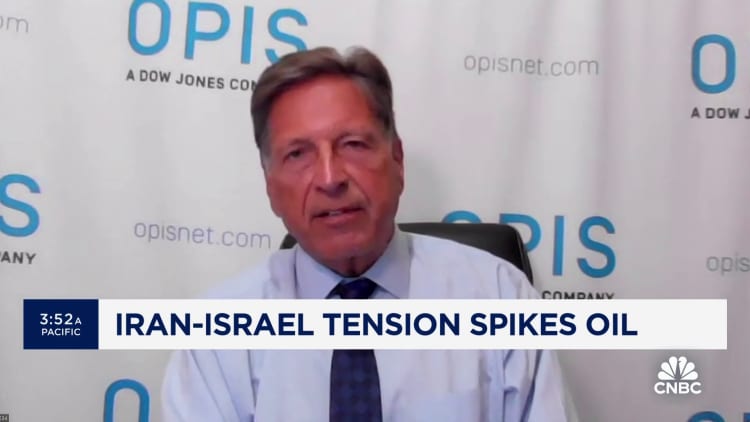
The Iranian attack on Israel this weekend marks a “new paradigm” in the Middle East conflict, which risks escalating into a wider regional war, Chatham House’s Middle East director said on Monday.
Sanam Vakil of the London-based think tank said the question was when, not if, Israel would respond after its war cabinet pledged on Sunday to “exact a price” on Tehran for its nighttime air attack on the Jewish state.
“Israeli leaders will have a hard time not reacting. They may not do it immediately, but I think a confrontation between Israel and Iran – which could be priced into the markets – is certainly coming , the question is just when,” Vakil said. told CNBC’s “Squawk Box Europe” on Monday.
Iran launched more than 300 drones and missiles against military targets in Israel on Saturday in response to a suspected Israeli strike that killed senior Iranian officials in Syria.
The attack, although well publicized in advance, presented an opportunity for Israel to burnish its image after its months-long attacks in Gaza, which many perceived as disproportionate to the Hamas terrorist attacks of October 7.

However, an Israeli counter-offensive risks further escalating tensions between the long-standing adversaries, moving from a “shadow war to a very direct and open war”, and drawing in their respective allies, said Vakil.
“We have become aware of a new paradigm in the Middle East. Warnings of regional war have proven real,” Vakil said in an additional research note emailed to CNBC.
“There’s not much certainty that Israel can strike Iran and retaliate without dragging the rest of the region into this broader conflict,” she added.
Focus on the American response
UN Secretary-General Antonio Guterres said on Sunday that the Middle East was “on the brink” and called for de-escalation between the two countries.
Vakil noted that regional actors were now counting on the United States and its Western allies to “impose restraint” on Israel to avoid a wider conflict.

US President Joe Biden has already insisted that Washington will not participate in any counter-offensive against Iran, even as he reiterated his support for Israel and summoned G7 leaders to agree on a coordinated response to Iran’s “brazen” attack.
His response will prove particularly sensitive as it could play a decisive role in the US presidential election in November.
“This attack on Israel has brought some warmth back into relations and shown that the United States still supports Israel. But the United States does not want, in this key election year, to get drawn into something bigger,” Vakil said. .
“Iran is a toxic asset for Washington, and you may have Republicans who criticize President Biden for not being tougher on Iran, so this is an inflection point that emerges throughout the countryside,” she added.
cnbc





